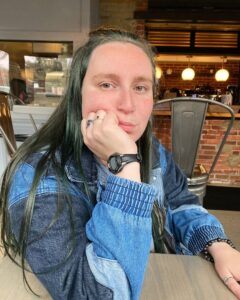Journeys to Humanism: The Religious Education that Undid Religion

Journeys to Humanism, theHumanist.com’s regular series, features real stories from humanists in our community. From heartwarming narratives of growth, to more difficult journeys, our readers open up about their experiences coming to humanism.
Ica Brown
Atlanta, GA
I was born and raised into the conservative branches of Christianity known as the Churches of Christ. My family attended a minimum of three church services and events per week. The beliefs of the Churches of Christ were heavily ingrained into my understanding of the world, and I was deeply enmeshed in the church community.
By the time I went to undergrad at a Christian school, I took numerous courses in the “Religion” department (in which we mostly studied one religion), and I graduated with multiple degrees, one of which was a B.A. in Religion. After undergrad, I obtained a Master of Divinity, during which I was required to study both ancient Hebrew and Greek. In so doing, I was granted a new way of reading biblical texts.
As I began delving into the ancient writings, I noticed all the lies and misinformation that church leaders had been inserting into my understanding throughout childhood and adolescence. I began to recognize more incongruences than I had ever realized before and many of them were mutually exclusive. My faith was shaken, and I started to doubt the religion into which I had been indoctrinated from a young age.
As I further spiraled into this time of deconstruction, I studied many different theist religions, and I could never understand how any group could believe themselves to be the only correct one. I started wondering more about the salvific and eschatological claims that I had been spoon-fed in the church, and I realized that our predecessors did not even believe in hell. I started to search for evidence and proof―of anything.
As time progressed, I began unlearning all of the harmful and hate-filled rhetoric of my childhood, and I started to publicly advocate for social justice movements. I fully recognized that many different religions acted against the morals and values they claimed to uphold. I felt that the most Christian thing I could do was to officially leave Christianity. I made it known that I could not stand with a group of people who did not recognize their own hypocrisy, exclusion, and hate which they called love.
Once being free from organized religion, I was happier than ever. I continued to think critically, further studying and partaking in open discussions; I sought out people who had understandings of the world which differed greatly from my own traditions and upbringing. I learned to truly embrace skepticism and curiosity, and I found meaning in critical thinking and the study of ethics.
I began doing volunteer work within my community and through non-profit organizations, and I found personal fulfillment in treating others with a love that had no space for shame nor guilt. I continued to focus on becoming a better person, taking responsibility for my role in making the world a better place for everyone.
One day while volunteering with a certain non-profit, an individual asked me about my faith. I claimed no faith and stated that I cared more about morality and goodness than I did about “god(s).” She responded by asking me if I had heard of “good without a god” – I had not. After returning home that evening, I looked up the phrase and learned about humanism. I was shocked to discover a cultural movement and philosophy of life that beautifully articulated so many of the feelings, thoughts, and beliefs I had come to uphold after leaving religion.
With newfound vigor, I began to delve into humanism, studying everything I could find about this certain way of life, and I began to feel less alone and more personally empowered. I committed to intentionally live my life by the Ten Commitments, genuinely desiring to be a part of a progressive movement that could help the greater good. I started to feel a sense of hope in knowing that there were others out there who believed in the common good of humanity. I looked at notable public figures who were humanists, and I studied their lives and their writings (when applicable). I craved that sense of community that I had lost when I left the church. I was able to find solace and understanding in a progressive movement that understands me and desires goodness. I was no longer alone and scared of what may come next, because I knew that I was genuinely in a nonjudgmental community.
Today, I proudly uphold the values of humanism and have found purpose and ways in which to deepen my compassion. I am grateful for those who have come before me and shared their lives and their stories. To know that there is goodness in this world that can and will exist without a god(s) is, for me, peace.
We all have our own stories of how we came to be humanists, and we want to hear yours! Fill out the form here to be featured in this series. You can also share your journey and chat with others on the Journeys to Humanism channel on the AHA’s Discord Server.
